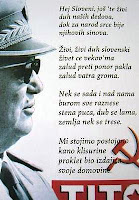The National Anthem of Argentina
 The lyrics of the Himno Nacional Argentino (the national anthem of Argentina) were written by Vicente López y Planes, and the music was composed by Blas Parera. This song was adopted as the national anthem on May 11, 1813, three years after the May Revolution (Revolución de Mayo). May 11 is therefore Anthem Day in Argentina.
The lyrics of the Himno Nacional Argentino (the national anthem of Argentina) were written by Vicente López y Planes, and the music was composed by Blas Parera. This song was adopted as the national anthem on May 11, 1813, three years after the May Revolution (Revolución de Mayo). May 11 is therefore Anthem Day in Argentina.On May 24, 1812, Vicente López attended a play presented at the Casa de la Comedia, Buenos Aires, titled El 25 de Mayo, which retold the story of the May Revolution that happened two years earlier. The play, written by Luis Ambrosio Morante, concluded with an anthem sung by the actors. López felt inspired and that same night wrote the first verses of an anthem that would replace Morante's, for which Blas Parera had composed the music.
The General Constituent Assembly, the autonomous government of the time, approved the new anthem as Marcha Patriótica (Patriotic March) on May 11, 1813, and commanded Parera to compose a new music. Some authors say that Parera accepted, but after many days no result was presented. Finally, he refused, being a Spaniard himself, as the lyrics were offensive to Spain, and he feared the reaction of the King. He was jailed by the Assembly and forced to compose under threat of execution. In a single night he finished the partiture, by simply copying the musical score he had composed for the theatre play. He was then released and later he abandoned the country forever, living for many years at Rio de Janeiro and later in Spain, where he died.
The finished song was first played on May 14, 1813 at the home of the aristocrat Mariquita Sánchez de Thompson, and presented publicly on May 25 of the same year. It was then known as Canción Patriótica Nacional (National Patriotic Song), and later simply as Canción Patriótica (Patriotic Song), but in an 1847 copy it appears under the title Himno Nacional Argentino, retaining that name until today.






